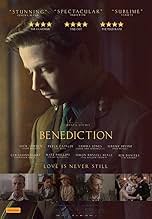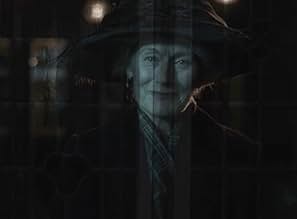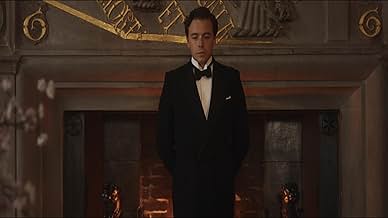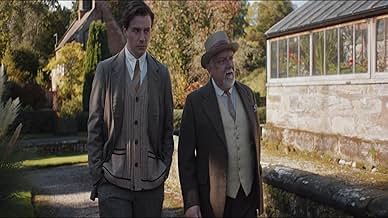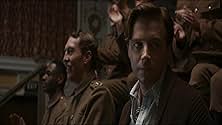AVALIAÇÃO DA IMDb
6,6/10
4,1 mil
SUA AVALIAÇÃO
A história do poeta, escritor e soldado inglês Siegfried Sassoon.A história do poeta, escritor e soldado inglês Siegfried Sassoon.A história do poeta, escritor e soldado inglês Siegfried Sassoon.
- Prêmios
- 9 vitórias e 22 indicações no total
Avaliações em destaque
Ignore the naysayers. This is a beautiful, deeply sad, elegant, and poetic film from one of the greatest filmmakers working today, Terence Davies. Many here are dismissing this film as "catty", "stereotypical", etc. It's not in the least. It's a film based on the life of Siegfried Sassoon, a real UK poet who served in WW1 with Wilfred Owen, the brilliant soldier who wrote the poetry that was the basis for Benjamin Britten's magnificent War Requiem and who was a friend/lover of Sassoon. Sasson was a poet himself, an artist, and like all artists, felt alienated throughout his life from the world he lived in. We see that art world from behind the curtain, and anyone who has ever worked, or been privvy to, the behind the scenes of the artistic world will attest this is how it is. This is the huge source of Sassoon's "alienation", not just that he's a homosexual, which many reviewers are insisting. There's a wonderful line that sums him up perfectly, and that is "most people live in the moment. You want to live in eternity". That's a beautiful, poetic summation not only of Sassoon's life, but of art in general. Davies's films often draw on art for their inspiration, and this one is no exception.
All of the performances are 1st rate, the cinematography is exquisite, the production design is breath taking, and the dialogue is some of the best I've heard in a film in a very, very long time. Thanks to Mr. Terence Davies for making such an extraordinary movie.
All of the performances are 1st rate, the cinematography is exquisite, the production design is breath taking, and the dialogue is some of the best I've heard in a film in a very, very long time. Thanks to Mr. Terence Davies for making such an extraordinary movie.
Brownie points to Netflix for sponsoring this movie, which must have only limited appeal even to older gay viewers. Jack Lowden stars as World War One poet Siegfried Sassoon (Jack Lowden), whose emotional and sexual life director Terence Davies explores in this gloomy biopic. After publishing a letter condemning the military chiefs for the appalling death toll the conflict has brought, Sassoon is lucky not to be shot as a traitor; they send him to a mental institution where he meets and falls in love with fellow poet Wilfred Owen who's suffering from shell-shock (as PTSD was called in those dark days). Owen is sent back to die in Picardy in the last week of the war. The screenplay skates past Sassoon's brief return to active service.
After the war Siegfried has a brief affair with Ivor Novello (Jeremy Irvine), shown here as the uber-bitch in London's far-from-discreet gay set. Siegfried has a longer but equally unhappy affair with upper-crust socialite Stephen Tennant (Calam Lynch), the model for Sebastian Flyte in Evelyn Waugh's BRIDESHEAD REVISITED. Unhappy with homosexual life and converting to Catholicism, Sassoon marries. Flash-forward to his later life shows Sassoon (now played by Peter Capaldi) at odds with his wife and their son.
Throughout the movie Davies inserts horrific glimpses of battle casualties which never cease to haunt Sassoon. His poems are voice-overed from time to time, although two poems of Owen's make it clear that Sassoon was somewhat Second Division in comparison.
This is a beautifully shot movie, and all the cast perfectly evoke the look and feel of the 1920s and 30s, but the scriptwriter's prevailing tone is depressing. Male lovers and a wife all fail to bring happiness to Siegfried Sassoon. A life unfulfilled; a glum movie.
After the war Siegfried has a brief affair with Ivor Novello (Jeremy Irvine), shown here as the uber-bitch in London's far-from-discreet gay set. Siegfried has a longer but equally unhappy affair with upper-crust socialite Stephen Tennant (Calam Lynch), the model for Sebastian Flyte in Evelyn Waugh's BRIDESHEAD REVISITED. Unhappy with homosexual life and converting to Catholicism, Sassoon marries. Flash-forward to his later life shows Sassoon (now played by Peter Capaldi) at odds with his wife and their son.
Throughout the movie Davies inserts horrific glimpses of battle casualties which never cease to haunt Sassoon. His poems are voice-overed from time to time, although two poems of Owen's make it clear that Sassoon was somewhat Second Division in comparison.
This is a beautifully shot movie, and all the cast perfectly evoke the look and feel of the 1920s and 30s, but the scriptwriter's prevailing tone is depressing. Male lovers and a wife all fail to bring happiness to Siegfried Sassoon. A life unfulfilled; a glum movie.
It's an anti-war biopic of the English poet Siegfried Sassoon that covers Sassoon's life from 1914 to the 1960s.
Siegfried Sassoon (Jack Lowden/Peter Capaldi) was a Second Lieutenant during World War I. His younger brother, Hamo (Thom Ashley), is killed during the war. Siegfried is further horrified by the tremendous human toll in death and lifelong disability caused by military leadership in which he no longer believes. Already a well-known poet, he refuses further participation in the war and is sent to the Craiglockhart War Hospital near Edinburgh technically for shell shock. There Siegfried meets and befriends Wilfred Owen (Matthew Tennyson), a much younger man. Siegfried also explicitly recognizes his own homosexuality.
The film then follows his anti-war sensibilities through snippets of his poetry and his chaotic love life, mainly focused on Ivor Novello (Jeremy Irvine) and Stephen Tennant (Calam Lynch/Anton Lesser). At a certain point, he tries to escape the chaos by marrying Hester Gatty (Kate Phillips/Gemma Jones). Together they have a son. George (Richard Goulding), but clearly, the marriage does not heal Sassoon's memories.
The film uses footage from the trenches in World War I and occasionally flips in time between the young Sassoon and the elderly Sassoon. Some of the editing decisions made little sense to me, particularly the early scene forecasting his conversion to Catholicism. Some edits made the film more complex than necessary. Nevertheless, the movie successfully portrays Sassoon as disabled because of World War I, from which he never psychologically recovered. This is clear from the multiple references to Wilfred Owens' poem, "Disabled."
Siegfried Sassoon (Jack Lowden/Peter Capaldi) was a Second Lieutenant during World War I. His younger brother, Hamo (Thom Ashley), is killed during the war. Siegfried is further horrified by the tremendous human toll in death and lifelong disability caused by military leadership in which he no longer believes. Already a well-known poet, he refuses further participation in the war and is sent to the Craiglockhart War Hospital near Edinburgh technically for shell shock. There Siegfried meets and befriends Wilfred Owen (Matthew Tennyson), a much younger man. Siegfried also explicitly recognizes his own homosexuality.
The film then follows his anti-war sensibilities through snippets of his poetry and his chaotic love life, mainly focused on Ivor Novello (Jeremy Irvine) and Stephen Tennant (Calam Lynch/Anton Lesser). At a certain point, he tries to escape the chaos by marrying Hester Gatty (Kate Phillips/Gemma Jones). Together they have a son. George (Richard Goulding), but clearly, the marriage does not heal Sassoon's memories.
The film uses footage from the trenches in World War I and occasionally flips in time between the young Sassoon and the elderly Sassoon. Some of the editing decisions made little sense to me, particularly the early scene forecasting his conversion to Catholicism. Some edits made the film more complex than necessary. Nevertheless, the movie successfully portrays Sassoon as disabled because of World War I, from which he never psychologically recovered. This is clear from the multiple references to Wilfred Owens' poem, "Disabled."
A slow, stately biopic about poet Siegried Sassoon and the demons that plagued him after serving in WWI.
The movie has serious Evelyn Waugh vibes, especially "Brideshead Revisited." WWI stories always fascinate me, especially when they're about how much the war screwed up the psyches of the people who were caught up in it. This film is overall satisfying, if a bit repetitive. A huge amount of time is spent on Sassoon, a more or less openly gay man, and his various love affairs, all with caricatures of flamboyant, bitchy gay men and all of them leaving you wondering what he wanted to be around them for in the first place. Seriously, were all gay men this hateful in the 1920s? But then you think about how marginalized they were, and the answer is, well, yeah, maybe they were. They had a lot to be hateful about.
The one reason to see this movie is a big one, and that's the central performance of Jack Lowden. He's magnificent in this. Easily award worthy, though a group like the Academy Awards wouldn't recognize him in a million years.
Grade: A-
The movie has serious Evelyn Waugh vibes, especially "Brideshead Revisited." WWI stories always fascinate me, especially when they're about how much the war screwed up the psyches of the people who were caught up in it. This film is overall satisfying, if a bit repetitive. A huge amount of time is spent on Sassoon, a more or less openly gay man, and his various love affairs, all with caricatures of flamboyant, bitchy gay men and all of them leaving you wondering what he wanted to be around them for in the first place. Seriously, were all gay men this hateful in the 1920s? But then you think about how marginalized they were, and the answer is, well, yeah, maybe they were. They had a lot to be hateful about.
The one reason to see this movie is a big one, and that's the central performance of Jack Lowden. He's magnificent in this. Easily award worthy, though a group like the Academy Awards wouldn't recognize him in a million years.
Grade: A-
Here's a lot of old fashioned Britishness we love. Repressed emotions hidden behind immaculate manner and only expressed through biting witty comments and classy bitching. But having partially lived in and experienced modern UK (or let's just say London, that is a world of its own) for over a decade now, it's the world that's almost gone... unless for such rare moments brought back by the dying breed as Terence Davies.
In that sense, the whole film is definitely sentimental, nostalgic... and gently bitter (as oppose to bitter sweet). Even the scenes of horror from WW1 are somewhat veiled with distinctively old fashioned verses of Siegfried Sassoon. For some reason most scenes with special effects (the scene where Siegfried dropping his medal being most noteworthy) feel so dated too, as in 90's film or a student project of SiFi.
My biggest issue in enjoying the film was that I gradually lost empathy with Siegfried. He starts off as gentle, smart young man, restrained but with lucid enough self-awareness and noble idealism of a youth. Then he dips in relationships with pretty but frivolous guys, predictably gets hurt by them, and then opts for a more conventional life of marriage and child in the selfish hope that the wife and son may give him the light he craves for. And then he ends up a bitter, distant, irritable and irritating old man, who vents out to his poor wife and suffering son, practically the only people left around, for their failure to become the light he wanted them to be.
Now, it's not entirely his fault alone. The horror of the war that scarred him for life and the intolerant society that kept him from acting upon his true love have a lot to answer for. Even his shallow, egoistic post-war lovers are largely because such bold 'crazy' ones were the only people who could live somewhat openly as gay in the repressive British society.
Nevertheless Siegfried had so many privileges - his uppercrust background, artistic talent, social recognition, and few but supportive friends. Despite of it all, he makes choices against his own truth and heart, and ends up a bitter resentful old man. His last ditch attempt to God wouldn't give him the solace he craves for.
I guess that is actually the message of the film - how giving up one's true heart and truth, whether by one's own will or circumstances, can leave one just a shell of oneself. And what's the worth of a poet when he can't speak his truth?
Overall it left me somewhat unsatisfied after 2 hours of run despite of its many enjoyable and charming virtues. I suspect Terence Davies himself has never quite overcome the pessimistic view he manifested in his early trilogy.
In that sense, the whole film is definitely sentimental, nostalgic... and gently bitter (as oppose to bitter sweet). Even the scenes of horror from WW1 are somewhat veiled with distinctively old fashioned verses of Siegfried Sassoon. For some reason most scenes with special effects (the scene where Siegfried dropping his medal being most noteworthy) feel so dated too, as in 90's film or a student project of SiFi.
My biggest issue in enjoying the film was that I gradually lost empathy with Siegfried. He starts off as gentle, smart young man, restrained but with lucid enough self-awareness and noble idealism of a youth. Then he dips in relationships with pretty but frivolous guys, predictably gets hurt by them, and then opts for a more conventional life of marriage and child in the selfish hope that the wife and son may give him the light he craves for. And then he ends up a bitter, distant, irritable and irritating old man, who vents out to his poor wife and suffering son, practically the only people left around, for their failure to become the light he wanted them to be.
Now, it's not entirely his fault alone. The horror of the war that scarred him for life and the intolerant society that kept him from acting upon his true love have a lot to answer for. Even his shallow, egoistic post-war lovers are largely because such bold 'crazy' ones were the only people who could live somewhat openly as gay in the repressive British society.
Nevertheless Siegfried had so many privileges - his uppercrust background, artistic talent, social recognition, and few but supportive friends. Despite of it all, he makes choices against his own truth and heart, and ends up a bitter resentful old man. His last ditch attempt to God wouldn't give him the solace he craves for.
I guess that is actually the message of the film - how giving up one's true heart and truth, whether by one's own will or circumstances, can leave one just a shell of oneself. And what's the worth of a poet when he can't speak his truth?
Overall it left me somewhat unsatisfied after 2 hours of run despite of its many enjoyable and charming virtues. I suspect Terence Davies himself has never quite overcome the pessimistic view he manifested in his early trilogy.
Você sabia?
- CuriosidadesSeven of Siegfried Sassoon's poems were narrated in the film: Concert Interpretation, Died of Wounds, When I'm among a Blaze of Lights, To my Mother, To my Brother, Attack, and Invocation.
- Erros de gravaçãoSassoon did not discard his M.C. medal as shown in this film. He tossed away the medal's corresponding ribbon. The medal itself was inherited by Sassoon's son George.
- Citações
Dr. Rivers: Why not?
Siegfried Sassoon: Too afraid, too inhibited. Shamed by an inner corruption. Or perhaps it's simply because of... What's the phrase? "The love that dare not speak its name."
Dr. Rivers: You are not alone in that respect.
Principais escolhas
Faça login para avaliar e ver a lista de recomendações personalizadas
- How long is Benediction?Fornecido pela Alexa
Detalhes
- Data de lançamento
- Países de origem
- Centrais de atendimento oficiais
- Idiomas
- Também conhecido como
- 베네딕션
- Locações de filme
- Chillington Hall, Port Lane, Brewood, Wolverhampton WV8 1RE, Reino Unido(Interiors and outdoor scenes)
- Empresas de produção
- Consulte mais créditos da empresa na IMDbPro
Bilheteria
- Faturamento bruto nos EUA e Canadá
- US$ 201.093
- Fim de semana de estreia nos EUA e Canadá
- US$ 50.970
- 5 de jun. de 2022
- Faturamento bruto mundial
- US$ 847.418
Contribua para esta página
Sugerir uma alteração ou adicionar conteúdo ausente





